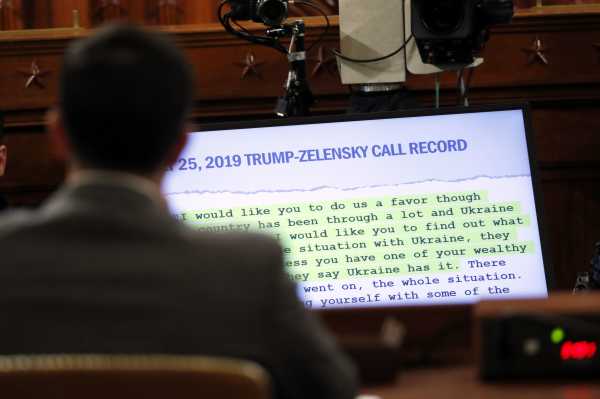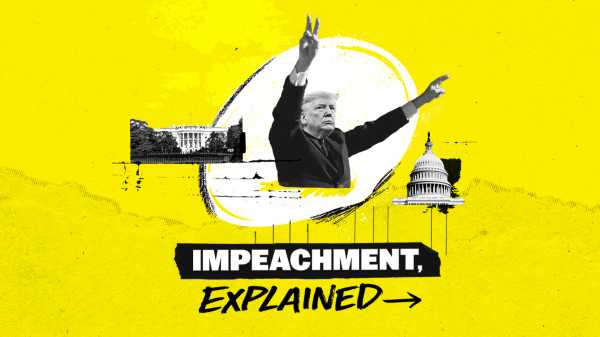
During an impeachment hearing Tuesday, Republican Rep. Devin Nunes praised the reporting of a “veteran investigative journalist” whose work had proven to be a “problem for the Democrats” and the media.
That journalist is John Solomon, formerly of the Hill and currently a Fox News contributor. Republicans like Nunes have relied on Solomon’s work during the impeachment inquiry to build the case that Trump was right to be concerned about former Vice President Joe Biden’s actions in Ukraine and those of his son, Hunter Biden, and to argue that the “real” scandal is how the Obama administration tried to get the Ukrainian government to cover up corruption.
But Solomon’s “journalism,” particularly on the subject of Ukraine, has been proven to be false, repeatedly. Solomon did not immediately respond to a request for comment.
Substantial reporting from outlets including ProPublica and the Daily Beast show that Solomon spread disinformation about Democratic presidential candidate Joe Biden and the former US Ambassador to Ukraine, Marie Yovanovitch. In his work, he effectively laundered dirt provided to him by Donald Trump’s attorney, Rudy Giuliani, producing articles that directly led to a whistleblower report alleging that Trump, based on Solomon’s false assertions, demanded the Ukrainian government investigate the Bidens or risk losing military aid.
The foremost allegation made by Solomon was published by the Hill in March, when Solomon interviewed the former Ukrainian prosecutor Yuri Lutsenko. In the interview, he accused then-US Ambassador to Ukraine Marie Yovanovitch of giving him a do-not-prosecute list to stop investigations into corruption. The accusation was proved false, and was ultimately recanted by Lutsenko himself — but by then, it was too late.
The falsehood had made it into the right-leaning media ecosystem, where other false allegations surfaced, like that Yovanovitch was anti-Trump and told Ukrainians to ignore him because he would soon be impeached. She was fired from her post in May of this year.
Trump was seemingly laser-focused on Yovanovitch, even referencing her in his infamously “perfect” call with Ukrainian President Volodymyr Zelensky as being “bad news.” But Yovanovitch’s real crime appears to have been standing in the way of Rudy Giuliani, and, more importantly, his efforts to investigate Joe Biden on behalf of the president’s reelection efforts, according to statements made by the former mayor to the Wall Street Journal.
As Republicans continue to dig in on impeachment, Solomon represents a media figure with mainstream credentials those supportive of Trump can use to burnish their views and their defenses of the president. But ironically, it’s Solomon, and Solomon’s misinformation stemming from Giuliani and others, that is responsible for the impeachment inquiry in the first place.
Solomon’s conspiracy theories came from Rudy Giuliani and his allies
This spring, John Solomon, then the executive vice president of digital at the Hill, posted an interview with former Ukrainian Prosecutor General Yuri Lutsenko, whom Solomon introduced as a “hero” who spent two years in prison for battling Russian “aggression.”
But that interview was actually part of a long-running smear campaign by Giuliani aimed at undermining the Ukrainian ambassador to help Trump.
As my colleague Andrew Prokop reported:
Solomon’s interview made a blockbuster (and false) assertion: Yovanovitch had given Lutsenko a “do-not-prosecute” list that included a founder of an anti-corruption group, Anti-Corruption Action Centre (AntAc). That group, according to Solomon, was funded by Hungarian-American billionaire (and conservative boogeyman) George Soros.
Solomon wrote that “the implied message to Ukraine’s prosecutors was clear: Don’t target AntAC in the middle of an America presidential election in which Soros was backing Hillary Clinton to succeed another Soros favorite, Barack Obama, Ukrainian officials said.”
But there was no “do-not-prosecute” list, which Lutsenko himself admitted a few weeks later. AntAc was funded by a host of entities, including donations from Ukrainian citizens and the European Union; the United States; the governments of the United Kingdom, the Netherlands, and the Czech Republic; alongside the Open Society Foundations, a Soros-developed grantmaking group. Lutsenko didn’t spend time in prison in retaliation for his efforts against Russia — he was sent to prison for embezzlement and abuse of office, two years before Russia became making incursions into Ukraine.
And in other articles for the Hill, Solomon made more false assertions about perceived enemies of Trump.
For example, he wrote that Joe Biden had pressured Ukraine to remove former Ukrainian Prosecutor General Viktor Shokin in order to shut down an investigation into Burisma, a Ukrainian energy company whose board included Biden’s son, Hunter Biden. Those allegations were turned into a 30-second attack ad for the Trump campaign on Facebook, viewed more than five million times. But former Ukrainian President Petro Poroshenko said that Biden’s demand for Shokin’s firing was not at all improper — and Biden was hardly alone in wanting Shokin, who was reportedly engaged in corrupt behavior, removed.
Solomon further wrote that a so-called black ledger that showed off-the-books payments made to former Trump campaign manager Paul Manafort by a pro-Russian political party — payments that resulted in Manafort’s resignation from the campaign — was fake. But that ledger is absolutely real.
In summary, Solomon falsely asserted that Democrats worked with Ukrainian officials to help spread falsehoods about Trump campaign officials and quash investigations into Joe Biden’s son, and that Yovanovitch had kept Ukrainian officials who might blow the whistle on the alleged scheme from entering the country. But none of that was true.
Solomon’s work relied heavily on information fed to him by Rudy Giuliani, who orchestrated, in the words of senior State Department official George Kent, a “campaign … full of lies and incorrect information” aimed at getting rid of Yovanovitch by connecting her to George Soros and a conspiratorial effort to help Hillary Clinton win the 2016 election — a theory that former National Security Council official Fiona Hill told Congress earlier this month seemed based on the falsehood that “George Soros rules the world and, you know, basically controls everything.”
Giuliani sent a host of memos containing misinformation to Solomon. As Jeremy Peters and Kenneth Vogel of the New York Times detailed:
Giuliani’s interest in smearing Yovanovitch centered on her refusal to permit a politically motivated investigation into the Bidens. But Giuliani also worked with two Ukrainian businessmen, Lev Parnas and his partner, Igor Fruman, to spread disinformation about Joe Biden and Yovanovitch, and they had motivations of their own.
As detailed by the New York Times in October, “Mr. Parnas and Mr. Fruman boasted that they had worked with Mr. Giuliani to force the recall this spring of the American ambassador to Ukraine, Marie L. Yovanovitch,” partly because Parnas believed Yovanovitch was getting in the way of his work in the oil industry. (Both have recently been indicted on campaign finance charges.)
Remember that Solomon interview with Lutsenko, in which Lutsenko said that he had received a “do-not-prosecute” list from the American ambassador? Parnas set up the interview, and according to ProPublica, watched the interview from the control booth.
More concerningly, Solomon was introduced to Parnas by his personal attorneys, Joe diGenova and Victoria Toensing, who had worked with Giuliani previously and, according to Fox News, were helping the former New York City mayor “to get oppo research on Biden.”
It was diGenova who was the source of the smear against Yovanovitch regarding her “anti-Trump” status, saying on Sean Hannity’s Fox News show in March, “The current United States ambassador Marie Yovanovitch has bad mouthed the president of the United States to Ukrainian officials and has told them not to listen or worry about Trump policy because he’s going to be impeached.” More recently, he’s claimed that George Soros controls a majority of the State Department.
When Solomon wrote that piece alleging that Yovanovitch had given Lutsenko a “do-not-prosecute” list, he sent a draft first, to three people: Parnas, diGenova, and Toensing.
As a result of investigations into the validity of Solomon’s work, Solomon’s columns were shifted from “news” to “opinion” in 2018. The editor-in-chief of the Hill announced Monday that his work is now being reviewed, “updated,” and in some cases, corrected by the paper’s staff. And members of Congress have decried his work as having “no veracity whatsoever.”
But Solomon stands by his stories, and even told Fox News he was considering “targeted legal action” against those who criticize him.
“Notorious for massaging facts”
Controversy isn’t exactly new for Solomon, whose previous reporting at larger outlets seems to have focused on “blockbuster stories” that lacked blockbuster facts. Or as the Washington Post’s then-ombudsman Deborah Howell put it, “a ‘gotcha’ without the gotcha.”
One example: when he wrote a front-page story for the Washington Post in 2007 about the sale of former Democratic vice-presidential candidate John Edwards’s home. One Washington Post reader said of the story, “I read it three times and could not figure out why it was a news story, let alone a front-pager. What’s worse was that the placement, the headline and the tone of the story clearly implied that former senator Edwards had done something sleazy.”
As the Columbia Journalism Review detailed in 2012:
Solomon’s career in journalism saw him at the Associated Press and the Washington Post in the 1990s and early 2000s before he became editor-in-chief of the Washington Times. There, he tasked himself with making the conservative-leaning newspaper the Washington Times more “objective;” using the term “gay” instead of “homosexual,” for example.
In 2008, he told the Washington City Paper of his work at the Washington Times, “The only point I have made with the reporters and editors who write for the news pages is there must be a bright line between opinion and editorializing that rightfully belongs on the op-ed and commentary pages and the fair, balanced, accurate, and precise reporting that must appear in the news sections of the paper.”
Solomon left the Washington Times in 2009 over financial issues, but returned in 2013 after a time spent as executive editor at the Center for Public Integrity — a tenure marked by no small degree of controversy, particularly over Solomon’s efforts to turn the Center into a daily reporting outfit (one that would pay a firm run by Solomon roughly 4 million dollars a year in commission, based on that firm’s projections).
But Solomon had a real talent for boosting traffic and getting attention, which became his focus when he left the Washington Times to go to Circa, a mobile news app that shut down in 2015 before being relaunched that same year by Sinclair Broadcasting Group, a right-leaning company perhaps best known for requiring outlets to run specific pro-Trump promotional segments.
Solomon became Circa’s chief operating officer. It was at Circa where Solomon gained the attention of some of the right’s biggest names, like Sean Hannity, for reporting alongside Sara Carter on how Michael Flynn was mistreated. Or how the “real” Russia investigation should focus on collusion between Hillary Clinton and the Department of Justice and alleged anti-Trump bias in intelligence services.
That line of argument didn’t gain him much credence among many journalists — one conservative writer told me that Solomon was “known to have credibility issues” that required readers to find a secondary source for any of his scoops. But in 2017, he joined The Hill, a paper that launched in 1994 and describes itself as “the newspaper for and about Congress, breaking stories from Capitol Hill, K Street and the White House.” I reached out to the editors at the paper, and will update if and when I hear back.
Your guide to the Donald Trump impeachment saga

Understand the impeachment process, from its history to what comes next. Explore the full guide here.
At The Hill, Solomon’s work continued to focus on “exclusive” stories that tended to fall apart under scrutiny, like the Uranium One allegations against Hillary Clinton, or ones that weren’t very exclusive at all, like a piece alleging that an attorney had “sought donor cash” for two women who accused Trump of sexual harassment (the attorney in question, Lisa Bloom, had set up a public GoFundMe for one of the alleged victims, which is not unusual).
But it was Solomon’s work on Ukraine — work based largely on misinformation given to him by Rudy Giuliani and associates of Giuliani, including his own attorneys — that made the biggest impact. Because it was that work that led to a whistleblower complaint focused on allegations that Trump, working with Rudy Giuliani, was “pressuring [Ukraine] to investigate one of the President’s main domestic political rivals” by withholding military aid.
In the White House’s partial transcript of a July 25 call between President Donald Trump and Ukrainian President Volodymyr Zelensky, Trump refers directly to assertions made by John Solomon:
Despite it now being called into question, John Solomon’s work remains an issue, in large part because it is still taken as fact among some right-leaning pundits and, clearly, the president himself.
On Friday, for example, conservative pundit Glenn Beck alleged that Yovanovitch should be “held for perjury” when she asserted during sworn testimony that she did not give Lutsenko a “do-not-prosecute” list. His source?
“Award-winning investigative journalist John Solomon.”
Sourse: vox.com






